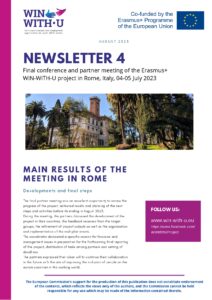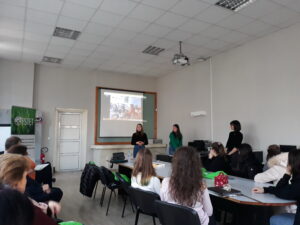The AHEAD train the trainers workshop took place between 21st and 24th of May 2019 in Birmingham, United Kingdom and was hosted by Birmingham City University. The aim of the joint training event was to ensure the transferability and multiplication of the AHEAD open educational recourses (OERs) by preparing faculty members and researches from the PC universities to teach and/or train in the area of innovation management and inclusive innovations, as well as entrepreneurship and social entrepreneurship education.
Around 35 representatives from the AHEAD partnership participated in the training and had the chance to discuss the topics including: Delivery of entrepreneurship teaching/ training; Human-centred Design, Design Thinking and Social innovation, customer development process; Innovation systems; Types of innovations; Technological learning, technological catch-up, technological leapfrogging; Inclusive and Grassroots innovation.
During the first day the participants were welcomed by the head of the Business school Prof Nassim Belbaly and the AHEAD project manager of BCU Dr. Charlotte Carey. The head of Business and Innovation Department of the Birmingham City Council Mr. Mohammed Zahir presented the policy perspective of innovations and entrepreneurship by sharing the main points from the Business Growth Programme. The Urban M project led by Birmingham City Council was also discussed showing a good example of partnership working and innovation in the cities.
Furthermore, guest lecturers from Birmingham City University and Coventry University presented various case studies including the Knowledge Transfer Partnerships (KTP) – the most successful government funded programme for linking business and universities; and the STEAM house – a collaboration space for developing innovations by entrepreneurs and start-ups where free business support is provided, as well as access to makerspace workshops and co-working space, a programme of STEAMlabs and events led by industry experts from many different sectors.
The next days were structured into training sessions following the topics from the AHEAD OERs. The ECQ team presented the developed materials and moderated the sessions dedicated to Inclusive innovation and the Challenges in building an ecosystem for inclusive innovation; scaling up inclusive and grassroots innovation; managing grassroots involvement in innovation and welcomed the feedback from the African HEIs. Our representatives also shared with the AHEAD partners the plans for the technical implementation of the Virtual Knowledge Gateways – a platform for collaboration between PC HEI researchers and external stakeholders.
We are looking forward to our further fruitful capacity building collaboration within the AHEAD project!









